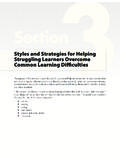Transcription of Should You Take a Lump Sum 2012 - Rest-of-Life
1 Should You take a Lump Sum Payment from your Pension Plan? A Trap for the Unwary! By Steve Vernon, FSA A Better Way to Prepare for Retirement! Rest-of-Life Communications 2012 1 Steve recently published Recession-Proof your Retirement Years, which describes ten steps to survive future downturns and thrive in your later years. Here he provides details on one of these steps making the best choice for benefits in traditional defined benefit plans. For details, see Suppose you re in your fifties or sixties and have worked 10 years or more for an employer with a tax-qualified defined benefit pension plan. Such a plan promises you a lifetime monthly retirement income ( an annuity), with the option to continue the lifetime income to a surviving spouse or beneficiary after you die.
2 You ve earned some serious retirement bread congratulations! Now suppose you re offered a lump sum payment in lieu of the annuity, either as a regular retirement or a special buyout. Should you take the money and run? If you re like many people who get this offer, you don t think too hard about this. The obvious answer: take the boatload full of money! After all, that s what your work buddies have done, and that s what many investment advisors recommend. I worked for 35 years as a consulting actuary, helping large corporations design, manage and communicate their retirement programs. Whenever I saw a lump sum buyout offer, acceptance rates varied from 50% to well over 90%. This made me shake my head in frustration, as often I felt it was the wrong decision.
3 Now don t get me wrong. In some instances a lump sum is the right decision. But too often people choose it for the wrong reasons. This article addresses common myths and explains the pros and cons, to help you decide what is one of the most important financial decisions you will ever make. You ll live with this decision for 20, 30 or 40 years, so it s well worth the minutes spent reading this article and thinking about the issues. your Big Challenge When you retire, you want to generate a retirement income that will last the rest of your life , no matter how long you live and no matter what happens in the economy. If you re married, this income needs to last for both of your lifetimes. Many people don t understand the risks and challenges with this goal; they underestimate how long they will live , they don t have adequate plans for dealing with market downturns, or they don t have a systematic method to draw down their retirement savings so that they don t outlive their money.
4 Learn Plan Act! helping People live Long and Prosper! 2 your first goal Should be to avoid outliving your money and becoming a burden on your children and society. If you re married, you don t want to die first and leave your spouse with inadequate financial resources. Here are some scary statistics: For one-fourth of unmarried elderly women, Social Security is their only source of income, and one-sixth of elderly widows have incomes below the poverty level. Misperceptions and Myths Often I see brokers and financial advisors target the employees of companies that offer lump sums, and they can be quite persuasive in favor of lump sums. Watch out if they automatically recommend the lump sum, and don t explain the pros and cons of each choice.
5 They have a vested interest if they want you to invest your money with them; they aren t in a position to provide unbiased advice. Even if they are truly unbiased, what is their expertise? Many advisors are good with investments, but they aren t skilled at delivering and sustaining a lifetime retirement income, which is a different problem. Often I hear myths that are reasons for taking a lump sum. Myth #1. If you take an annuity and you die soon after you retire, your employer wins and your heirs get nothing. If you take a lump sum, your heirs are the winners, not the company. This is the scary what if you get in a car crash scenario, but it shouldn t be a deciding factor in your decision.
6 Reality. If you believe this myth, then electing a lump sum is a bet that you ll die soon after you retire. Do you want to win this bet? If you take an annuity, you re betting that you ll live a long time. Would you rather win this bet? Most people are more likely to live a long time than die soon after retirement. If you re married and elect the surviving spouse annuity, both of you have to die soon under the car crash scenario; this is very unlikely. Base your decisions on what s most likely to happen, with contingency plans in case unlikely events happen. If you are considering an annuity but are worried about dying early in your retirement, the contingency plan is to elect a form of payment that continues the annuity to a spouse or beneficiary after you die, or to buy life insurance.
7 If you take a lump sum, you d better have a strong contingency plan for living a long time! Finally, consider the consequences of losing these bets. If you choose the lump sum, you lose if you live too long and run out of money before you die. Bad outcome for you, bad for your spouse if he/she outlives you, and even worse for your children who might need to support you! If you choose the annuity and lose by dying soon after you retire (and with no beneficiary election), only your heirs lose. And besides you re dead! Will you really care? Which consequence is worse for you? For me, losing the lump sum bet is much worse than losing the annuity bet, and losing the lump sum bet could be disastrous for my spouse and my children!
8 Learn Plan Act! helping People live Long and Prosper! 3 Myth #2. Lump sums are calculated using low interest rates (in the 4% to 5% range for 2012). You can easily beat these rates through investing in the stock market, which has averaged over 8% per year over the long run. Reality. Yes, lump sums are calculated with low interest rates. So what? Have you paid attention to the stock market lately? It doesn t earn a steady 8% each year, and often goes down, sometimes by a lot. If you rely on your lump sum for retirement income, market volatility can be another phrase for I need to go back to work. If you take a lump sum payment, make significant withdrawals of principal soon after you retire, and the stock market declines, then you might not have enough assets to recover.
9 In addition, the interest rate is just one factor in determining lump sums. Longevity is also an important factor; lump sums are calculated assuming your longevity will be about average compared to men and women your age. If you take a lump sum and live longer than average, you lose. How hard is it to beat the average life expectancy? It s not rocket science eat right, exercise, don t smoke, manage your stress. If you are in good health and take care of yourself, a lump sum may not be a good idea. Myth #3. Most pensions are fixed, and aren t indexed for inflation. In 20 or 30 years, your pension won t buy a bag of groceries. You re better off taking the lump sum and investing it in stocks, where you have a chance of keeping up with inflation.
10 Reality. This myth actually has some elements of truth to it, but you need to think a little harder before using this as a reason to take the lump sum. Yes, it s true that most pensions aren t indexed for inflation. And yes, if you successfully invest in stocks over the long run, if you avoid market declines early in your retirement, and if you prudently withdraw from your assets so that you don t outlive your resources, there s a chance you might be better off. But these are big ifs, and they can leave you vulnerable to mistakes. One way to deal with inflation is to maximize your lifetime retirement income, which often happens with the annuity as you ll see later in this article. Also, you can take the annuity and still protect yourself against inflation; here are some strategies: If you have 401(k) accounts and other retirement assets, or own real estate, consider them as your hedge against inflation, and invest them appropriately.






